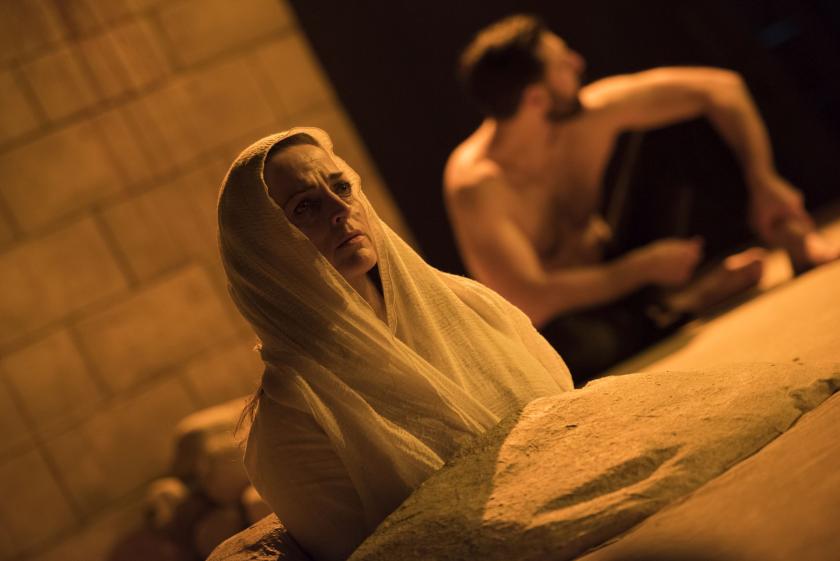Layla is trapped in a pit of sand up to her shoulders, with a shroud over her head and piles of rocks surrounding her. On steps Nur, who has been tasked with arranging the rocks. The two were engaged in an adulterous affair, and he must begin the public stoning of his lover by casting the first stone.
So begins Sinners, which is directed by Brian Cox, the Scottish actor who received a Golden Globe last month for his role in HBO’s Succession. This production of Joshua Sobol's play was seen in America in 2017 and you can understand Ansari's desire to return to a production on which she gets an additional credit as co-producer: the character represents a strong, forceful woman confident in herself and willing to fight for her right to freedom.
Not that the subject matter is easy: stoning remains a legal punishment in 16 countries, and references to laptops and helicopters locate the play firmly in the modern world. Set in an unnamed country somewhere in the Middle East, this work from the leading Israeli playwright, now 80, poses questions about power and sexuality across 80 minutes that just manages to hold the audience’s attention. Ray Recht’s set design is dominated by a wall littered with bullet holes and stained with streaks of blood. Rocks occupy the stage’s border, with Nur reluctantly adding and moving these cold, impersonal weapons. As the rocks collect into mounds, they become almost symbolic cairns for those women killed in this barbaric manner.
Ray Recht’s set design is dominated by a wall littered with bullet holes and stained with streaks of blood. Rocks occupy the stage’s border, with Nur reluctantly adding and moving these cold, impersonal weapons. As the rocks collect into mounds, they become almost symbolic cairns for those women killed in this barbaric manner.
Adding to the transgressive affair is Layla’s own personal strength. An older woman who occupies a position of power as a Professor of English Literature, Layla graphically talks about sex, including a particularly macabre reminiscence set in a graveyard. Her voice, Nur suggests, unmans him. Layla teases and toys with Nur: “I’m so wet,” she declares at one point – a powerful, defiant statement given her arid entrapment.
A passing reference to Shakespeare’s Macbeth implies the dynamic of this relationship: Nur says he has been “unsexed” by his relationship with Layla, echoing Lady Macbeth. Yet there’s nothing of the uncanny about these characters: both are flawed and broken, and Cox’s direction teases out these complexities with clarity.
Ansari does an impressive job of vocally showing Layla’s range; one minute she is a seductress capable of bringing Nur to orgasm with words alone and the next she begs him to kill her. Her intense stares and commanding speeches create a powerful woman, yet there's an equal sense of her teetering on the edge of desperation.
Adam Sina as Nur roves from sobbing lover to a man infuriated by his own helplessness and impotence. Sina’s irrepressible movement offers a striking contrast to Ansari’s stillness, but for a brief, liminal moment, Layla steps out of her confinement and dances. Choreographed by Laya Torkaman, Ansari’s movements are sharp and free as she moves with Sina across the stage, and the dance achieves a similar power to Ibsen’s vaunted tarantella. However, arriving just 15 minutes before the play’s end, the placing of the dance itself is bizarre, and would have been more effective if earlier so as to add to the evocative descriptions of the couple’s intimate relations. (It's only a shame that the sound design by Ed Clark doesn't make more of the guards and crowds of people who are heard only fleetingly.)
Sinners explores what it means to be trapped, whether physically or romantically or via social rules. Layla and Nur move in and out of love and through numerous emotions, shame and anger coming within seconds of heartfelt declarations of passion. The overall effect is a sweltering relationship that just about sustains sufficient theatrical heat.















Add comment